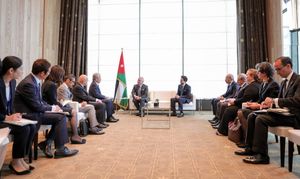The recent remarks made by the Chairman of Larsen & Toubro (L&T), SN Subrahmanyan, have ignited controversy across India, especially among labor leaders and politicians. Speaking at the CII Mystic South Global Linkages Summit 2025 held in Chennai, Subrahmanyan pointed out the growing reluctance among workers to migrate for job opportunities. He attributed this hesitance to the impact of government welfare schemes, claiming such programs provide financial security and lessen the urgency for movement among potential workers.
"Labour is not willing to move for opportunities. Maybe their local economy is doing well, maybe it is due to the various government schemes and direct benefit transfers available to them, but they are not willing to move," Subrahmanyan said during his address.
His comments instantly drew sharp criticism from various quarters, particularly from BJP MP and Confederation of All India Traders (CAIT) Secretary General Praveen Khandelwal. Khandelwal condemned Subrahmanyan’s statements as "misleading, insulting, and demoralizing" to India's diligent labor force. He emphasized the progress and resilience of workers who, thanks to various welfare initiatives led by Prime Minister Narendra Modi, have improved their livelihoods.
"The statement made by Mr Subrahmanyan is not only misleading but also insulting and demoralizing to the immense progress and development..." Khandelwal remarked, defending the government's ambitious schemes like the Mahatma Gandhi National Rural Employment Guarantee Act (MGNREGA) and direct benefit transfers, which he believes have empowered millions.
Khandelwal urged corporate leaders to focus more on improving working conditions rather than blaming government initiatives. He suggested companies should assess their own wage structures and employment practices to attract workers more effectively. "If companies are facing labour shortages, they should introspect on whether they are offering fair wages, decent working conditions, and social security to attract workers," he added.
Subrahmanyan’s controversial statements also touched on the broader issue of the rapidly changing workplace culture, particularly within the information technology (IT) sector. He noted how the workforce, particularly new graduates, now display reluctance to relocate for job opportunities. "When I joined L&T, my boss said if you are from Chennai, you go to Delhi and work. But today, if I ask a person from Chennai to work out of Delhi, he says bye. It’s a different world of work today, and we have to see how to make HR policies flexible," he explained.
This trend of aversion to relocation reflects broader shifts among younger professionals who prefer the comfort of remote work over traditional office environments. Subrahmanyan's acknowledgment of such changes indicates the increasing challenges companies face when trying to bring staff back to physical workspaces—a sentiment echoed by many senior leaders across various industries.
Despite all efforts, the construction sector continues to struggle with labor shortages, which Subrahmanyan claims could hinder India’s infrastructure development. He points out the high attrition rates within his company, mentioning how L&T requires around 400,000 workers but ends up recruiting approximately 1.6 million due to the constant turnover.
Adding to the complexity, Subrahmanyan compared the current labor challenges with his personal experience, stating, "It is a funny world which we are trying to live in; many of us wearing slightly more white hair are trying to understand it." He stressed the necessity for more adaptable and flexible HR policies to account for the fast-evolving work culture, which is significantly different from when he began his career.
Adding another layer to his recent statements, it’s worth noting Subrahmanyan has been under fire for advocating what many viewed as unreasonable work expectations, particularly following his earlier suggestion of instituting a 90-hour workweek for employees. His comments then questioned the balance between professional and personal time, triggering outrage not only from employees but also from other business leaders and public figures.
This recent flare-up surrounding Subrahmanyan’s comments emphasizes the complex relationship between welfare policies, employee mobility, and the current labor market environment within India. It highlights the urgent need for open dialogue between corporate leaders, government officials, and workers to navigate these challenges effectively.
With both Khandelwal and Subrahmanyan sparking heated discussions, it’s clear the conversation continues to evolve as stakeholders from various sectors seek to find common ground to pave the way for India’s future growth.



